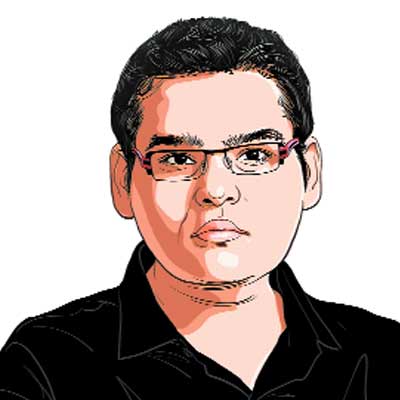

Jan 1, 2025 07:30 IST First published on: Jan 1, 2025 at 07:30 IST
When I told a friend I am spending some of my winter break working on a preview of digital technologies, there was a considered silence. “Are you going to be all doom and gloom about it?” she asked. I checked my notes and was surprised that while the risks and consequences of emerging technologies continue to persist, often impacting the most vulnerable among us, I am still beginning the year on a note of hope — with some caveats.
Most positive reports of technology development and deployment focus on innovation, economy, and access as indicators of success and growth. However, technologies are not mere tools. They are conditions that shape us, contexts we live in, and contestations that define how we work, speak, and love. So, instead of looking at the shiny new thing or the next big thing, I am choosing to focus on five significant milestones that future technology users will look at as history-in-the-making.
The year 2024 will go down in history as the one when we accepted digital and data privacy as our foundational right. The passing of the historic Digital Personal Data Protection Act (DPDP) put India in league with developed nations that offer the most comprehensive protection to individual and personal data online. The DPDP might not dramatically change how we use the internet, but in the backend, it puts severe limitations and safeguards on how our data is used in our digital transactions. Conversations around digital privacy in India started in 2009, with the establishment of the Unique Identification Authority of India, which later became Aadhaar. It has taken many consultations, protests and mobilisations, and greater public literacy, for data privacy to become a fundamental right. Going forward, the DPDP rightly puts the responsibility for the protection and safety of individual data on companies, intermediaries, and actors rather than individuals, and marks a wonderful way forward for securing our digital futures.
As the year of general elections though, 2024 was also the year of misinformation. The unsupervised, uncontrolled, and weaponised use of misinformation for political segregation, profiled targeting, inciting hatred, and creating conditions of deep uncertainty were visible throughout the year. It is impossible to point fingers at just one source or bad actor because we have witnessed an entire ecosystem of misinformation forming in the country. Significant work has been done by fact-checking communities, the unsung heroes diligently fighting these misinformation attacks. However, we are left with a naturalised misinformation baseline that particularly targets women, non-conforming people, and minority communities in disproportionate ways. In 2025, we can only hope that the pioneering work started by the amazing information warriors, who have shown that human collectives are essential to counter AI-driven misinformation, will continue to grow.
Generative AI is the elephant in the room, where no matter what we talk about, we eventually talk about the disruptions and affordances it has been bringing in. This is an emerging technology and we will have to live through the futures it is foretelling. While it is impossible to figure out what will persist, the one thing to look out for is the localisation of technologies. For the longest time, the digital divide has been exacerbated by language divides. While many other populous language groups have successfully created local language internet spheres — think about the Chinese and Spanish internets, for example — India has lagged in developing local internets. Partly, this has been because of varying literacy levels, partly because of the linguistic diversity of the country, and partly because of the reluctance of corporations who do not cater to smaller language communities because they are not considered profitable. With Generative AI, the leaps we have made in simultaneous multi-language translation are incredible. GenAI language apps are expanding and supporting the phenomenal work of Open Knowledge champions and collectives like Wikipedia. This brings forward the possibilities of localising technologies and enabling more people to find a voice online.
The next trend that is worth recognising is the emergence of universal access in the country. This does not feature immediately in the imagination of the glossy, consumerist, big-tech internet stories we are used to. However, the consistent expansion of digital access, and India’s rise in network readiness,found fruition in 2024. For those of us who remember the struggle to preserve net neutrality in the country without sacrificing universal access, 2025 will be the year that proves the two can co-exist. As more Indians in rural and disconnected parts come online, as India continues to offer one of the most competitive and affordable rates of digital access, and as we build more community-driven hubs, there is hope for more equitable social and economic structures for mobility and development.
most read
And if there was ever something more to look forward to, it is you, the people. 2024 in tech was also a year of people using tech. More than ever before we are online, connected, talking to each other. There are continued assaults on our collective imagination and power. Yet, even as technologies become more consolidated and corporatised, the efforts of people who fight to keep the internet free, open and empathetic are what make it worth maintaining. Perhaps 2025 would turn out to be the year where we learn to care not only for the people around us, but also those far away facing genocide, violence and hate. One can only live in hope.
In this new year, I hope that we continue to focus on establishing digital infrastructures as fundamental rights, offering opportunities and safeties to marginalised and first-time-users to participate in our digital futures.
The writer is professor of Global Media at the Chinese University of Hong Kong and faculty associate at the Berkman Klein Centre for Internet & Society, Harvard University, USA
Why should you buy our Subscription?
You want to be the smartest in the room.
You want access to our award-winning journalism.
You don’t want to be misled and misinformed.
Choose your subscription package


